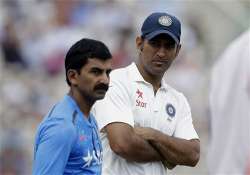Ind vs Eng: Should Dhoni, BCCI to blame for goof-up on Jadeja-Anderson affair ?
London: Indian cricket captain Mahendra Dhoni's obstinacy and ignorance about the International Cricket Council's (ICC) processes have caused an unmitigated loss for Indian cricket on the James Anderson affair, where it could have been victory.The

London: Indian cricket captain Mahendra Dhoni's obstinacy and ignorance about the International Cricket Council's (ICC) processes have caused an unmitigated loss for Indian cricket on the James Anderson affair, where it could have been victory.
The latest and lasting slap was delivered Wednesday when the ICC, ignoring the Board of Control for Cricket in India's request, refused to appeal an order by judicial commissioner Gordon Lewis which rejected the Indian touring party's accusation against Anderson.
The Indian visitors now in England were offered mediation and a closure, which could have included an apology from Anderson. This would have been a win of sorts. But Dhoni dissuaded the Indian team manager Sunil Dev from engaging in talks with Paul Downton, managing director of cricket at the England & Wales Cricket Board (ECB).
Earlier, the ECB's chairman Giles Clarke had approached ICC chairman N. Srinivasan, who has been sidelined by the Supreme Court as the president of the BCCI. The latter spoke to Dhoni but the Indian skipper was adamant about pursuing the Indian side's charge against Anderson.
Anderson has a long history of directing foul language at batsmen in the middle. This is unacceptable; and can also, if reported by an umpire, be deemed to be a breach of ICC's code of conduct. Whether he went to the extent of pushing Indian all-rounder Ravindra Jadeja inside the pavilion during the lunch break on the second day of the 1st Test at Trent Bridge, Nottingham was, of course, another matter.
Notably, the ECB never denied Anderson was involved in an incident. It, however, dismissed this by describing it as a “minor” matter. Minor or not, physical contact is tantamount to a “Level 3” offence under the ICC's code of conduct.
The latest and lasting slap was delivered Wednesday when the ICC, ignoring the Board of Control for Cricket in India's request, refused to appeal an order by judicial commissioner Gordon Lewis which rejected the Indian touring party's accusation against Anderson.
The Indian visitors now in England were offered mediation and a closure, which could have included an apology from Anderson. This would have been a win of sorts. But Dhoni dissuaded the Indian team manager Sunil Dev from engaging in talks with Paul Downton, managing director of cricket at the England & Wales Cricket Board (ECB).
Earlier, the ECB's chairman Giles Clarke had approached ICC chairman N. Srinivasan, who has been sidelined by the Supreme Court as the president of the BCCI. The latter spoke to Dhoni but the Indian skipper was adamant about pursuing the Indian side's charge against Anderson.
Anderson has a long history of directing foul language at batsmen in the middle. This is unacceptable; and can also, if reported by an umpire, be deemed to be a breach of ICC's code of conduct. Whether he went to the extent of pushing Indian all-rounder Ravindra Jadeja inside the pavilion during the lunch break on the second day of the 1st Test at Trent Bridge, Nottingham was, of course, another matter.
Notably, the ECB never denied Anderson was involved in an incident. It, however, dismissed this by describing it as a “minor” matter. Minor or not, physical contact is tantamount to a “Level 3” offence under the ICC's code of conduct.